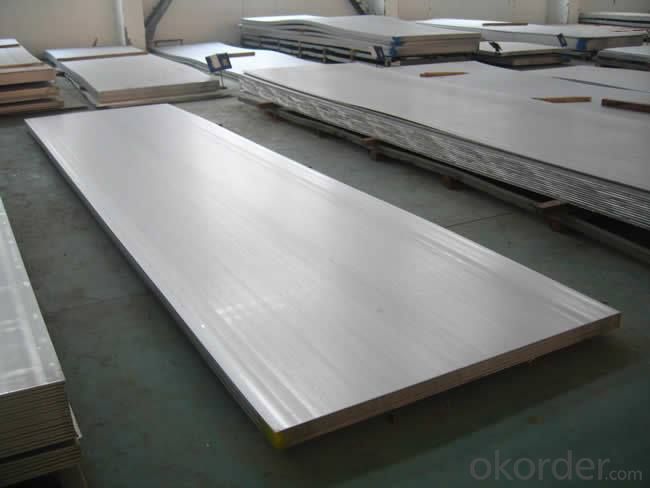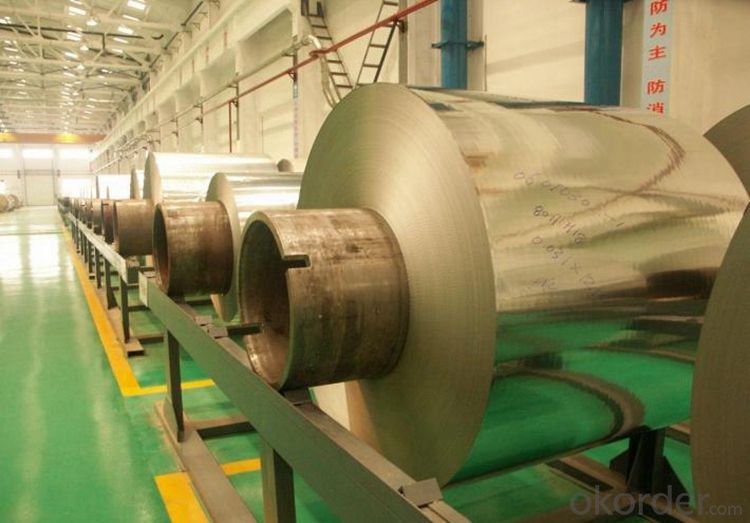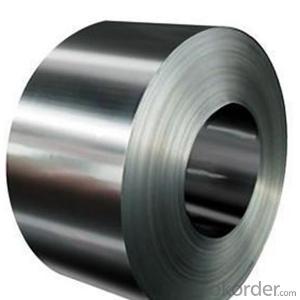Steel Plate Made in China With Good Price Grade 304
- Loading Port:
- Shanghai
- Payment Terms:
- TT OR LC
- Min Order Qty:
- 25 m.t.
- Supply Capability:
- 10000 m.t./month
OKorder Service Pledge
OKorder Financial Service
You Might Also Like
Item specifice
Description for Stainless Steel Coils/Sheets:
Prodcut:Stainless Steel Coil
Thinckness: 0.20mm-8.0mm
Width:1000mm, 1219mm(4 feet), 1250mm, 1500mm, 1524mm(5 feet),
1800mm, 2000mm, 2200mm, 2500mm,and customizable
Ni:0.8~1.2% Cu:1.4~1.5% Cr:14
Standard: ASTM, JIS, GB, BS, DIN etc
Grade: 200series&300series&400series
Surface finish: 2B, BA, 8K, 6K, Mirror Finished, No1, No2, No4, Hair Line with PVC
Manufacture technology: cold rolled/hot rolled
Thickness Tolerance: +/-0.1mm
Width Tolerance: +/-10mm
200 Seriers: 201,202
300 Seriers: 301, 304, 304L, 316L, 309, 310S,321
400 Seriers: 410, 410S, 409L,430
Features of Stainless Steel Coils
(1)Good ductility
(2)Good corrosion resistance
(3)Excellent abrasion resistance and fatigue strength
(4)Good weldability
(5)Oxidation resistant performance
(6)Excellent in high temperature
Application for Stainless Steel Coils/Sheets:
Boiler heat exchanger, machinery andpetroleum ,chemical industries, hardware fields,Food industry,construction material,kitchen utensils, building construction, medical equipment,chemical tank, pipe etc
Application of Stainless Steel Coils
(1)Boiler heat exchanger,
(2)Chemical industries,
(3)Hardware fields,
(4)Construction material,
(5)Kitchen utensils,
(6)Building construction,
(7)Medical equipment,
(8)Chemical tank,
(9)Pipe etc
Detail picture for Stainless Steel Coils/Sheets


Export Markets for Stainless Steel Coils/Sheets:
Our target market is the international market. Every year we export most of products to countries like India, Pakistan, South Korea, Brazil, Australia, South Africa, Spain, Sri Lanka, Taiwan, Hong Kong, etc.
FAQ for Stainless Steel Coils/Sheets:
Q:What are the advantages of your company ?
A: We have many professionals, technical personnel, more competitive prices and best after-dales service than other stainless steel companies.
Q:Can you arrange the shipment ?
A: Sure we can help you with the shipment. We have forwarders who have cooperated with us for many years.
- Q:What is the difference between regular steel stainless steel? Why does steel rust but stainless wont? Is stainless some kind of alloy or something? Any knowledgeable input would be great. Thanx!
- steel is also an alloy - principally of iron and carbon. The reason ordinary steels rust is that the iron oxide is not tightly bound to the surface, revealing fresh metal to be oxidised. Stainless (like aluminium and titanium, both very reactive metals) forms a tough coat of oxide that protects the bulk.
- Q:I'm assuming that brass is flexible, expands and then bounces back to it's original shape. But if aluminum and steel expand and don't contract wouldn't they cause guns to jam more often for example?
- Reloading Aluminum Cases
- Q:How do steel coils contribute to the aerospace manufacturing industry?
- The aerospace manufacturing industry heavily relies on steel coils due to their numerous benefits and contributions to overall aircraft production efficiency and quality. To begin with, steel coils are essential in fabricating various structural components of an aircraft, including wings, fuselage, and landing gear. Steel's high strength and durability make it an appropriate material for these critical parts, guaranteeing aircraft safety and reliability. Moreover, steel coils provide the raw material necessary for the precise manufacturing processes required in the aerospace industry, enabling the creation of lightweight yet sturdy structures capable of withstanding the demanding flight conditions. Apart from their structural applications, steel coils also find use in producing smaller aircraft components, such as fasteners, connectors, and brackets that hold different parts of the aircraft together. Steel's exceptional mechanical properties, including resistance to fatigue and corrosion, make it a preferred choice for these components, ensuring their long-term performance and safety. Furthermore, steel coils contribute to the aerospace manufacturing industry by facilitating cost-effective production processes. Steel is widely available in large quantities, making it a cost-efficient material for aircraft manufacturing. Additionally, the ability to produce steel coils in various sizes and thicknesses allows manufacturers to tailor their production to specific aircraft models or design requirements, minimizing waste and optimizing resource allocation. Moreover, steel coils offer inherent recyclability, which aligns with the aerospace industry's increasing focus on sustainability. Recycled steel can be used to produce new coils, reducing the need for raw material extraction and minimizing environmental impact. This circularity in the use of steel coils supports the aerospace industry's efforts towards a more sustainable and environmentally friendly manufacturing process. In conclusion, steel coils play a vital role in the aerospace manufacturing industry by providing the necessary materials for aircraft structures and components. Their strength, durability, cost-effectiveness, and recyclability make them a valuable resource, ensuring the safety, reliability, efficiency, and sustainability of aircraft production.
- Q:Can steel coils be welded?
- Yes, steel coils can be welded. Welding is a widely used process for joining metal components, including steel coils.
- Q:How are steel coils inspected for thickness using ultrasonic testing?
- Steel coils can be inspected for thickness using ultrasonic testing, which is a non-destructive testing method. In this process, a handheld ultrasonic thickness gauge is used to measure the thickness of the steel coil. The ultrasonic thickness gauge emits high-frequency sound waves that travel through the steel coil. These sound waves bounce back from the backside of the coil, creating an echo. The time taken for the echo to return to the gauge is measured and used to calculate the thickness of the coil. The gauge consists of a transducer that emits the sound waves and a receiver that detects the echoes. The transducer is placed on the surface of the coil, and a coupling gel or oil is used to ensure a good acoustic contact between the transducer and the steel surface. The transducer emits a short burst of sound waves, which penetrates through the steel coil and reaches the backside. When the sound waves encounter any changes in the thickness of the coil, such as defects or variations, they get reflected back to the transducer. The receiver detects these echoes, and the time between the emission and reception of the sound waves is measured. Using the known speed of sound in steel, the time taken for the sound waves to travel through the coil and back can be converted into a thickness measurement. This provides an accurate assessment of the thickness of the steel coil at various points. Ultrasonic testing is a reliable and efficient method for inspecting the thickness of steel coils. It allows for quick measurements without damaging the material, making it suitable for quality control and ensuring compliance with manufacturing specifications.
- Q:How are steel coils inspected for flatness?
- Steel coils are inspected for flatness by using a variety of methods and techniques to ensure they meet the required standards. One common method is through visual inspection, where trained inspectors visually examine the surface of the coil for any signs of waviness or unevenness. They look for any visible defects such as waves, buckles, or twists that may affect the flatness of the coil. Another method used for inspecting flatness is through the use of specialized equipment such as flatness gauges or profilometers. These instruments measure the surface profile of the coil and provide detailed information about any deviations from the desired flatness. They can detect both local and overall flatness issues, allowing for a more accurate assessment of the coil's quality. In addition to visual and instrumental inspections, steel coils can also undergo physical tests to assess their flatness. One such test is the "drape" test, where the coil is draped over a flat surface and any noticeable gaps or unevenness are measured. This test provides a quick and practical way to identify any major flatness issues. Furthermore, computerized analysis and simulation techniques are becoming increasingly popular for inspecting the flatness of steel coils. These methods involve using advanced software to analyze the coil's surface data and generate detailed reports on its flatness characteristics. By comparing the actual surface profile with the desired specifications, these techniques provide a comprehensive assessment of the coil's flatness. Overall, inspecting steel coils for flatness involves a combination of visual inspection, specialized equipment, physical tests, and advanced analysis techniques. These methods ensure that the coils meet the required flatness standards, which is crucial for their successful use in various industries like automotive, construction, and manufacturing.
- Q:What are the common industry standards for steel coils?
- Steel coils in the industry have varying standards depending on the region and specific use. However, there are widely accepted standards used in the steel industry. Among the most frequently used standards for steel coils is the American Society for Testing and Materials (ASTM) standard. ASTM has created various specifications for different types of steel coils, including hot-rolled, cold-rolled, and galvanized coils. These specifications outline the mechanical and chemical properties that the steel must meet, as well as dimensions, tolerances, and testing requirements. Apart from ASTM, international organizations like the International Organization for Standardization (ISO) and the European Committee for Standardization (EN) have also established standards for steel coils. ISO standards, such as ISO 3574 and ISO 5952, offer guidelines for general requirements, dimensional tolerances, and mechanical properties of steel coils. Similarly, EN standards like EN 10130 and EN 10131 specify the characteristics and tolerances for cold-rolled steel coils. Moreover, industry-specific organizations and associations may have their own standards for steel coils. For instance, the American Iron and Steel Institute (AISI) has developed specific standards for various steel products, including coils. These standards cover aspects including chemical composition, mechanical properties, and surface finish. It's worth noting that steel coil standards can also be determined by the intended use. Industries like automotive, construction, and manufacturing may have specific requirements that surpass general standards. In such cases, customers and manufacturers may refer to industry-specific standards or collaborate to define custom specifications. In summary, while there are several common industry standards for steel coils, it is crucial to consult the specific standards and requirements applicable to the region and application in question to ensure compliance and quality.
- Q:How are steel coils used in the production of transportation equipment?
- Steel coils are used in the production of transportation equipment, such as automobiles, ships, and trains, to create various structural components. These coils are typically shaped and formed into parts like chassis, frames, bodies, and panels, providing strength, durability, and stability to the vehicles. Additionally, steel coils can be used in the manufacturing of wheels, axles, and suspension systems, ensuring reliable performance and safety in transportation equipment.
- Q:I have been wanting a new pair of hiking boots, but haven't had the money. I just got a job that requires me to have steel toed boots. The job is only for a few weeks, but I may be required to wear them on other jobs in the future. Regardless of which style I get, I will most likely be buying Red Wing boots. On their website, I see they have steel toed hiking boots. What is the purpose of a steel toed hiking boot? Why would a hiker need to have steel toed boots? Wouldn't that just be more weight? I see that some of their hiking boots have aluminum toes, claiming to be 33% lighter than steel with the same protection. Would these boots be good potential hiking boots as well as suitable for construction or should I just focus on work boots and buy myself some hiking boots at a later date?
- Steel toed boots is a safety factor thing. Wilderness workers ie lumber jacks need safety shoes as well. But for long distance hiking steel toed shoes would be impractical due to the weight and wear and tare on The trails and your body. Get the boots you need for work, get the hiking boots you want after the next paycheck.
- Q:Can steel coils be coated with organic materials?
- Yes, steel coils can be coated with organic materials.
1. Manufacturer Overview |
|
|---|---|
| Location | |
| Year Established | |
| Annual Output Value | |
| Main Markets | |
| Company Certifications | |
2. Manufacturer Certificates |
|
|---|---|
| a) Certification Name | |
| Range | |
| Reference | |
| Validity Period | |
3. Manufacturer Capability |
|
|---|---|
| a)Trade Capacity | |
| Nearest Port | |
| Export Percentage | |
| No.of Employees in Trade Department | |
| Language Spoken: | |
| b)Factory Information | |
| Factory Size: | |
| No. of Production Lines | |
| Contract Manufacturing | |
| Product Price Range | |
Send your message to us
Steel Plate Made in China With Good Price Grade 304
- Loading Port:
- Shanghai
- Payment Terms:
- TT OR LC
- Min Order Qty:
- 25 m.t.
- Supply Capability:
- 10000 m.t./month
OKorder Service Pledge
OKorder Financial Service
Similar products
New products
Hot products
Related keywords
































